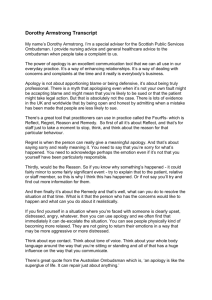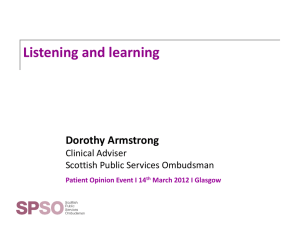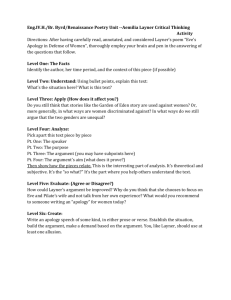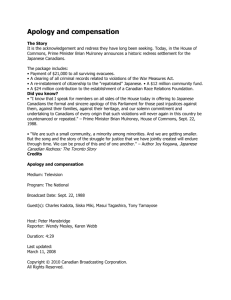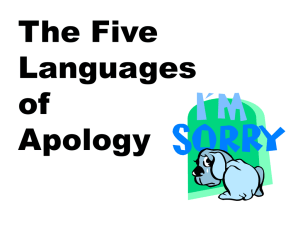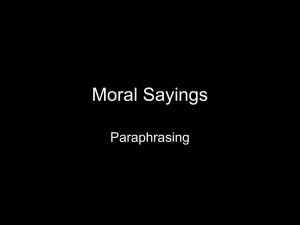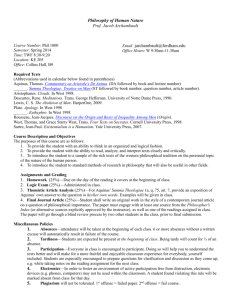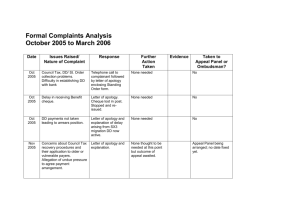the role of apology in negotiation
advertisement
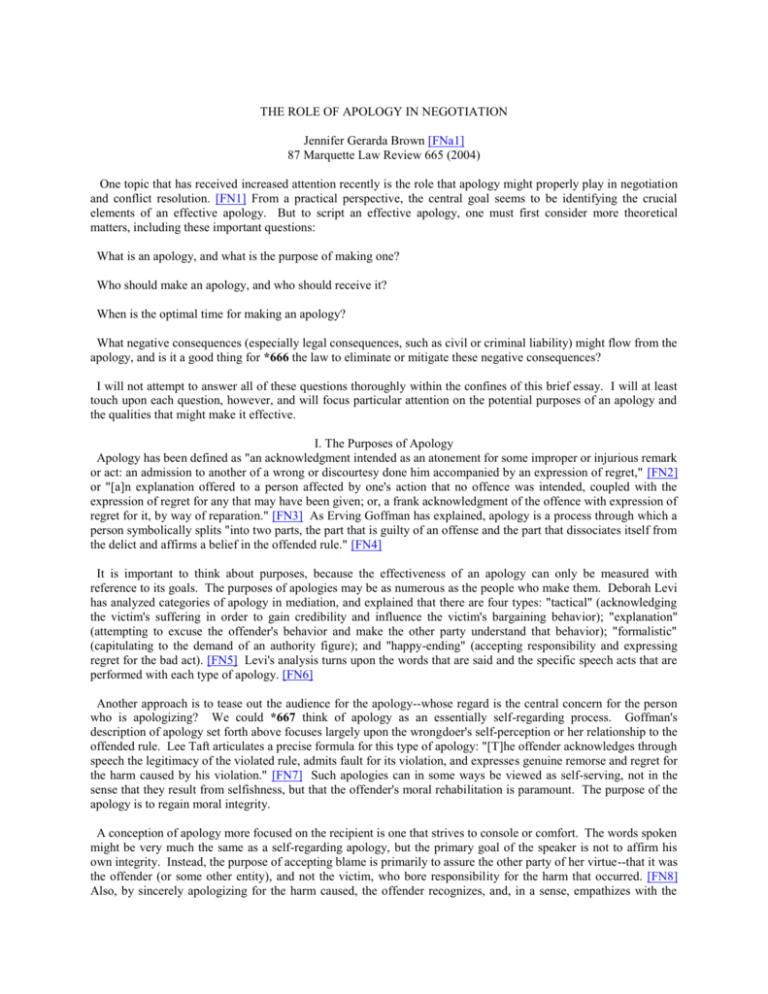
THE ROLE OF APOLOGY IN NEGOTIATION Jennifer Gerarda Brown [FNa1] 87 Marquette Law Review 665 (2004) One topic that has received increased attention recently is the role that apology might properly play in negotiation and conflict resolution. [FN1] From a practical perspective, the central goal seems to be identifying the crucial elements of an effective apology. But to script an effective apology, one must first consider more theoretical matters, including these important questions: What is an apology, and what is the purpose of making one? Who should make an apology, and who should receive it? When is the optimal time for making an apology? What negative consequences (especially legal consequences, such as civil or criminal liability) might flow from the apology, and is it a good thing for *666 the law to eliminate or mitigate these negative consequences? I will not attempt to answer all of these questions thoroughly within the confines of this brief essay. I will at least touch upon each question, however, and will focus particular attention on the potential purposes of an apology and the qualities that might make it effective. I. The Purposes of Apology Apology has been defined as "an acknowledgment intended as an atonement for some improper or injurious remark or act: an admission to another of a wrong or discourtesy done him accompanied by an expression of regret," [FN2] or "[a]n explanation offered to a person affected by one's action that no offence was intended, coupled with the expression of regret for any that may have been given; or, a frank acknowledgment of the offence with expression of regret for it, by way of reparation." [FN3] As Erving Goffman has explained, apology is a process through which a person symbolically splits "into two parts, the part that is guilty of an offense and the part that dissociates itself from the delict and affirms a belief in the offended rule." [FN4] It is important to think about purposes, because the effectiveness of an apology can only be measured with reference to its goals. The purposes of apologies may be as numerous as the people who make them. Deborah Levi has analyzed categories of apology in mediation, and explained that there are four types: "tactical" (acknowledging the victim's suffering in order to gain credibility and influence the victim's bargaining behavior); "explanation" (attempting to excuse the offender's behavior and make the other party understand that behavior); "formalistic" (capitulating to the demand of an authority figure); and "happy-ending" (accepting responsibility and expressing regret for the bad act). [FN5] Levi's analysis turns upon the words that are said and the specific speech acts that are performed with each type of apology. [FN6] Another approach is to tease out the audience for the apology--whose regard is the central concern for the person who is apologizing? We could *667 think of apology as an essentially self-regarding process. Goffman's description of apology set forth above focuses largely upon the wrongdoer's self-perception or her relationship to the offended rule. Lee Taft articulates a precise formula for this type of apology: "[T]he offender acknowledges through speech the legitimacy of the violated rule, admits fault for its violation, and expresses genuine remorse and regret for the harm caused by his violation." [FN7] Such apologies can in some ways be viewed as self-serving, not in the sense that they result from selfishness, but that the offender's moral rehabilitation is paramount. The purpose of the apology is to regain moral integrity. A conception of apology more focused on the recipient is one that strives to console or comfort. The words spoken might be very much the same as a self-regarding apology, but the primary goal of the speaker is not to affirm his own integrity. Instead, the purpose of accepting blame is primarily to assure the other party of her virtue--that it was the offender (or some other entity), and not the victim, who bore responsibility for the harm that occurred. [FN8] Also, by sincerely apologizing for the harm caused, the offender recognizes, and, in a sense, empathizes with the victim's pain. Still another approach to apology places third-party effects at the forefront. Here, the primary audience for the apology is not so much the victim of the wrongdoing as it is a third party, often an authority figure. In this case, the obligation to apologize is externally imposed rather than internally driven. Parents of young children may fear that they generate such apologies when they insist that their misbehaving children "say they are sorry," but the instrumental effect can also be seen in adults who hope to reduce criminal sentences by apologizing to their victims. [FN9] In addition to the benefits of apology in some criminal law contexts, it is clear that apology can yield advantages in civil lawsuits as well. Sometimes, *668 defendants in civil cases will seek to reduce expected liability by apologizing in mediation or settlement negotiations. [FN10] Such "tactical" apologies (using Levi's rubric) are selfregarding in the sense that their central aim is defensive, but they are simultaneously attuned to the effect the apology will have on the recipient, for they are at least partially motivated by a desire to elicit specific action (concession) on the part of the other person. So far, I have discussed the affirmative purposes of apology, and certainly these differences will determine the elements of effective apologies in various contexts (as we shall shortly discuss). But one cannot begin to delineate the characteristics of a good apology without acknowledging the risks of apology. Jonathan Cohen labels these risks "psychological, strategic, void insurance coverage, and legal liability." [FN11] Theoretical and policy debates have focused on this final category: state statutes, [FN12] federal rules of evidence, [FN13] and other forms of privilege [FN14] aim to create safe space in which apologies can be made without giving rise to admissions of fault or liability. Scholarly debate has raged about whether apologies made in this safe space can be effective or morally authentic. [FN15] II. The Qualities of an Effective Apology This section will synthesize some of the literature on apology [FN16] to suggest essential elements of an apology. Not only purpose, as outlined above, but also context (including the prior relationship between the parties) [FN17] will exert strong influence on the formulation of a good apology. In addition, there are important questions about legitimacy in those who deliver and receive apologies. When the offense is specific, short-running, or has occurred within *669 the context of a single relationship (or small set of relationships), the answers to these questions will be fairly straightforward. It will not be difficult to identify an offender who might apologize and a victim who might receive the apology. This is not to say that it is always easy to identify victim and offender; in some relationships each person will play both roles. But if the harm has occurred on a small scale or in an interpersonal context, we can usually identify people who, if willing, could legitimately apologize or receive an apology on their own behalf. When the offense is more complex, more historical, or has occurred on a grander scale, the situation becomes much more difficult. Perhaps it is clear that the Pope can legitimately speak for the Roman Catholic Church and apologize for complicity in the Holocaust, [FN18] and any living Holocaust survivors are the clear recipients of that apology. [FN19] But are they the only ones? Can the victims' descendants also be recipients of the apology? Are current-day Roman Catholics, while not perhaps the intended recipients, nonetheless an important audience for this apology? Consider groups that lack a central and authoritative leader such as the Pope. Is it possible for such groups or institutions to apologize authentically? [FN20] Almost everyone seems to agree that an apology should be the result of some analysis and introspection on the part of the offender--if it comes too spontaneously or off-the-cuff it loses power and legitimacy. This can create a tension. The offender may need time in order to reflect upon the harm done, form true remorse for the offense, and prepare a heartfelt apology, but the more an apology is delayed the more profound the offense may seem in the *670 eyes of the victim. This leads some commentators to conclude that a person should apologize as soon as possible (and this folds in the time and introspection that may be necessary to make the apology possible). Ken Blanchard and Margret McBride outline in great detail the process of introspection that should precede an apology. They urge the reader to ask the following questions in order to discover and acknowledge the wrong that might have occurred: What mistakes did I make? Did I dismiss another person, their wishes, feelings, or ideas? Did I take credit when it was not due? Why did I do this? Was it an impulsive, thoughtless act? Was it calculated? Was it a result of my fear, anger, or frustration? What was my motivation? How long have I let this go on? Is this the first or repeated time? Is this behavior becoming a pattern in my life? What is the truth I am not dealing with? Am I better than this behavior? [FN21] Blanchard and McBride are advising people who might wish to apologize for harm they have caused in business or social contexts; they focus on the emotional, rather than the legal, setting of an apology. Still, their questions might be adapted to a range of situations. The central value here is a guided process of moral inventory--taking stock of one's behavior and the harm that *671 it might have caused. But what comes next seems to be the bone of contention. Does one apologize for the harm that has occurred--the outcome of one's acts--or for the acts themselves? Lee Taft and others have argued that in order to be effective, an apology must articulate the norm that has been violated [FN22] and, in Goffman's terms, "affirm a belief in the offended rule." [FN23] Sometimes the offended standard is a personal one--a sense of oneself that has been compromised by errant behavior. [FN24] In other cases, it will be a rule, policy, or social norm of the organization or group of which the offender is a part. In some cases, it will be a legal standard or rule, and it is the breaking of that rule that may give rise to liability. Others contend that something short of a "full apology" (one that admits fault and expresses regret) can be effective and helpful to the recipient. For example, Jonathan Cohen argues that even though "a full apology will usually be most powerful," [FN25] it can also be constructive to simply express sympathy for harm that has occurred, without also taking moral or financial responsibility for that harm. [FN26] A final question that emerges is whether the promise to change something in the future is an essential element of an effective apology. The promised change might relate to the offender's own behavior [FN27] or it could involve promises to repair the harm done. Is an apology complete without this attempt to restore the status quo where possible? [FN28] For lawyer negotiators, the precise wording, timing, and delivery of the apology will depend upon client preferences, the legal context, and the needs of the opposing party. Cohen, Levi, Taft, and other legal scholars have enriched our thinking about client *672 counseling, however, by highlighting the importance of apology. III. Implications The existing literature on apology challenges us to think further about this important moment in conflict. In many legal disputes, the moments for apology come and go without notice or action, either because lawyers do not think to advise their clients on this point, or because aversion to vulnerability (emotional or legal) makes people overly cautious about pursuing this avenue toward resolution. If apology becomes a more accepted point of client counseling and subsequent negotiation, there will be many interesting lines for further inquiry. I will mention two. First, what responsibilities does an apology create in the receiver? Lee Taft conceives of apology as a necessary link between "an inner urging to repent" and "forgiveness as a moral option for the offended," the "centerpiece in a moral dialectic between sorrow and forgiveness." [FN29] Does the outcome of the apology matter? Having delivered a heartfelt apology, is the offender entitled in any way to expect a positive response from the other party? To what extent can an offender expect that a moral victim will accept the apology and even forgive? If such acceptance and forgiveness are not forthcoming, can the apologizing person somehow be converted into a victim of a new harmful event? Second, from a policy perspective, what sort(s) of apologies should we be trying to encourage, and how might the law play a role in creating the conditions that will facilitate desired apologies? When we create incentives for people to apologize, do we rob the resulting apologies of their potential power? This takes us back to the debate concerning "protected apologies." Lee Taft may be correct in finding stronger moral force when an offender apologizes against self interest, incurring greater vulnerability or exposure. For apologies designed primarily to restore the offender's moral integrity, perhaps such action against self-interest is essential. But as I explained above, not all apologies are formulated for this purpose. When the primary audience is the victim or a third party, even a "protected" apology can achieve laudable ends. After all, bringing true comfort to a suffering victim is no small matter. *673 IV. Conclusion For some victims words will not be enough. Actions must accompany and give effect to the words if the apology is to have any meaning at all. [FN30] Sometimes, the follow-on activity will be subject to negotiation. In many cases, an apology will be necessary to make that negotiation possible. The better we understand the potential purposes and formulations of effective apologies, therefore, the richer our understanding of negotiation will be. [FNa1]. Professor of Law and Director, Center on Dispute Resolution, Quinnipiac University School of Law. J.D. University of Illinois; A.B. Bryn Mawr College. I thank Michael Moffitt, Carole Frampton, David Sally, and Ian Ayres for helpful conversations and comments. I also learned a great deal about apology and forgiveness from Jonathan Cohen, Dana Curtis, Fred Luskin, and Lee Taft when they presented a roundtable discussion on the topic as part of the Quinnipiac-Yale Dispute Resolution Workshop, and I thank them for their generosity of mind and spirit. [FN1]. See, e.g., William K. Bartels, The Stormy Seas of Apologies: California Evidence Code Section 1160 Provides a Safe Harbor for Apologies Made After Accidents, 28 W. St. U. L. Rev. 141 (2000-01); Max Bolstad, Learning From Japan: The Case for Increased Use of Apology in Mediation, 48 Clev. St. L. Rev. 545 (2000); William Bradford, "With a Very Great Blame on Our Hearts": Reparations, Reconciliation, and an American Indian Plea for Peace with Justice, 27 Am. Indian L. Rev. 1 (2002-03); Charles R. Calleros, Conflict, Apology, and Reconciliation at Arizona State University: A Second Case Study in Hateful Speech, 27 Cumb. L. Rev. 91 (199697); Jonathan R. Cohen, Advising Clients to Apologize, 72 S. Cal. L. Rev. 1009 (1999); Jonathan R. Cohen, Legislating Apology: The Pros and Cons, 70 U. Cin. L. Rev. 819 (2002); Taryn Fuchs-Burnett, Mass Public Corporate Apology, Disp. Resol. J., July 2002, at 27; Elizabeth Latif, Apologetic Justice: Evaluating Apologies Tailored Toward Legal Solutions, 81 B.U. L. Rev. 289 (2001); Erin Ann O'Hara & Douglas Yarn, On Apology and Consilience, 77 Wash. L. Rev. 1121 (2002); Aviva Orenstein, Apology Excepted: Incorporating a Feminist Analysis into Evidence Policy Where You Would Least Expect It, 28 Sw. U. L. Rev. 221 (1999); Donna L. Pavlick, Apology and Mediation: The Horse and Carriage of the Twenty-First Century, 18 Ohio St. J. on Disp. Resol. 829 (2003); Lee Taft, Apology Subverted: The Commodification of Apology, 109 Yale L. J. 1135 (2000). [FN2]. Webster's Third New International Dictionary (1961). [FN3]. Oxford English Dictionary (2d ed. 1989). [FN4]. Erving Goffman, Relations in Public 113 (1971). [FN5]. Deborah L. Levi, The Role of Apology in Mediation, 72 N.Y.U. L. Rev. 1165, 1172-75 (1997); see also Pavlick, supra note 1, at 832 n.8. [FN6]. Levi, supra note 5, at 1178 n.50 (Apologies are words that do not just say something; they "'do something."') (internal citation omitted). [FN7]. Taft, supra note 1, at 1140 (citing Nicholas Tavuchis, Mea Culpa 3 (1991)). [FN8]. For a possible example of such a comforting apology, see Jennifer Gerarda Brown, The Use of Mediation to Resolve Criminal Cases: A Procedural Critique, 43 Emory L.J. 1247, 1280 (1994) (quoting Attempted Murder: Confrontation (Home Box Office, Final Script 14 1991) (offender says: "See, the reason why I wanted to meet you is because I wanted to tell you it was not your fault. It was not deliberate. Like I said, it was the ghetto. All that stress. And I apologize for doing damage to your life and your family. I apologize.")). This provides an example of an apology in which the offender falls somewhat short of taking full responsibility for his actions, but nonetheless attempts to make clear that the victim was not the responsible party. See also Douglas Stone et al., Difficult Conversations 44 (1999) (because "[i]f someone intended to hurt us, we judge them more harshly than if they hurt us by mistake," it is important to clarify people's intentions when discussing difficult situations). [FN9]. See generally Brown, supra note 8. This closely parallels Levi's "formalistic" apology. See Levi, supra note 5. [FN10]. Cohen, Advising Clients to Apologize, supra note 1, at 1066 (People can gain "financial benefits from doing what is ethically right."). [FN11]. Id. at 1023. [FN12]. Mass. Gen. Laws Ann. ch. 233, § 23C (West 2000); see also Tex. Civ. Prac. & Rem. Code Ann. § 18.061 (Vernon 2003). [FN13]. Fed. R. Evid. 408. The rule states in pertinent part: "Evidence of conduct or statements made in compromise negotiations is... not admissible." Id. For a thorough analysis of the rule and its impact on apology, see Cohen, Advising Clients to Apologize, supra note 1, at 1032-36. [FN14]. See Unif. Mediation Act § 4 (2002) (creating a privilege for mediation communications). [FN15]. One of the most notable critiques comes from Lee Taft, who argues against such instrumentalism. Apology "offers the offender a vehicle for expressing repentance and the offended an opportunity to forgive," but "'protected' apology" subverts this "moral process." Taft, supra note 1, at 1138. [FN16]. This literature is too vast for me to do it justice in this forum; interested readers should consult the excellent articles cited supra note 1. [FN17]. For an analysis of apology in various substantive legal contexts, see Cohen, Advising Clients to Apologize, supra note 1, at 1054-61. [FN18]. Pope to Apologize for Sins Committed by Roman Catholics, CNN.Com http://www.cnn.com/2000/WORLD/europe/03/07/vatican.pardon.02/. (Mar. 7, 2000), [FN19]. Interestingly, many Jewish leaders found the Pope's statement "disappointing," perhaps because it admitted fault in such a low-key, general way. See id. [FN20]. "National Sorry Day," for example, grew out of frustration with the Australian government's failure to apologize to the Aboriginal people for the forced removal of Aboriginal and Torres Strait Islander children from their families, which the government practiced for 150 years, into the early 1970s. As one organization devoted to planning the day explained: Sorry Day will be an important step on the road which all Australians are "walking together." It can help restore the dignity stripped from those affected by removal; and it offers those who carried out the policy--and their successors--a chance to move beyond denial and guilt. It could shape a far more creative partnership between Indigenous and non-Indigenous Australians, with immense benefit to both. Web site for the Sorry Day Committee, at http:// www.austlii.edu.au/au/special/rsjproject/sorry/. The literature on restorative justice and reparations examines these questions in great depth. See, e.g., Bradford, supra note 1, at 13437; John Braithwaite, Restorative Justice and Responsive Regulation (2002). [FN21]. Ken Blanchard & Margret McBride, The One Minute Apology 110 (2003). [FN22]. Taft, supra note 1, at 1141 (Nixon's attempted apology in his August 1974 resignation speech failed because he "failed to acknowledge his specific offense, and he failed to identify the norm broken."). [FN23]. See Goffman, supra note 4 and accompanying text. [FN24]. Blanchard and McBride write at some length about this sort of norm. They argue that in order to regain integrity, people must recognize that what they did is inconsistent with who they want to be and reaffirm that they are better than their poor behavior. Blanchard & McBride, supra note 21, at 50. [FN25]. Cohen, Advising Clients to Apologize, supra note 1, at 1048. [FN26]. Id. at 1067. [FN27]. See, for example, the Roman Catholic "Act of Contrition," often spoken as part of the sacrament of reconciliation (or, in pre-Vatican II days, "penance"), which requires a person to articulate a "resolve" to "amend my life." [FN28]. Some would argue that such restoration is crucial. See, e.g., Blanchard & McBride, supra note 21, at 50 (stating that a person who apologizes should "make amends" for harm done, make a commitment to self and others "not to repeat the act, and demonstrate [that] commitment by changing... behavior"). [FN29]. Taft, supra note 1, at 1143. [FN30]. In experimental settings, researchers have found that apologies can be effective in restoring trust and cooperation in simulated negotiation, but not as effective as trustworthy actions. See William P. Bottom et al., When Talk is Not Cheap: Substantive Penance and Expressions of Intent in Rebuilding Cooperation, 13 Org. Sci. 497 (2002); Maurice Schweitzer et al., Promises and Lies: Restoring Violated Trust, at http://opim.wharton.upenn.edu/~ schweitz/papers/Promises%20and%20Lies.pdf (last modified May 21, 2003) (Wharton Working Paper) ("[A] 'cheap talk' promise can speed initial trust recovery, but such a promise followed by a series of observed, trustworthy actions is no more effective in restoring long-term trust than a series of trustworthy actions alone.").
